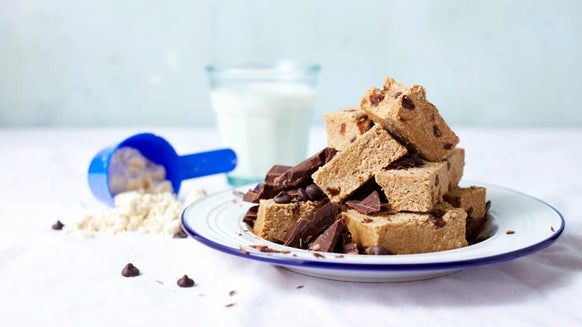
Just like we all have different personalities, we’re clearly all born with different physical attributes that give us a unique appearance. But did you know that some people are born with specific body types that make it easier to burn fat or store muscle? Some people do tons of cardio without seeing fat loss while others have to work harder to build muscle. Once you learn your body type, you can adjust your training to maximise your results.
In this article, you'll find:

What is your somatotonic body type?
There are three primary classifications of body types: ectomorphs, endomorphs, and mesomorphs. These are based on your body’s physical appearance and natural inclination to build muscle or burn calories easily. While our body types may be controlled by genetics (passed down from our parents), the way that we choose to interact with our environments, through diet and exercise, can impact the way that our body responds and changes.
Ectomorphs, in general, are naturally tall and thin, and they struggle to gain weight or build muscle.1 They have higher than average metabolisms and burn calories easily.1 They have to work harder to gain body mass because their bodies are so efficient. This may be frustrating for someone who is lifting weights often without seeing results and can lead to injury from over training. Ectomorphs may benefit from high calorie protein supplements to build mass.
Endomorphs are the opposite body type. They are naturally larger in stature — both height and width, and often have wider waists and hips.1 Individuals with this body type naturally hold on to more body fat. Even if they’re muscular or build muscle, it’s often harder to see the definition due to their body’s inclination to store fat. They work harder to burn fat and also may struggle to see their desired results. Endomorphs may be tempted to follow very low calorie diets and keep working even harder when they don’t see their desired results.
Mesomorph
Mesomorphs are the happy medium between the two previous body types, and often have broad shoulders and naturally thin waists.1 The term somatotonic means aggressive and energetic — like their energy levels often reflect. Their bodies often have high muscle mass and low body fat, making it easy for them to use diet and exercise to reach their desired physical results.1 However, mesomorphs have an average metabolism, which means that overeating can cause weight gain and under eating can lead to struggle to build muscle — also a combination of challenges. Often, mesomorphs are naturally athletic and excel at bodybuilding due to their genetic make-up.
Training for a mesomorph body type
The key for a naturally lean person with the ability to build muscle is to balance their training to stay fit without burning too many calories and losing muscle mass.
- Moderate to heavy weights
When doing resistance training, mesomorphs need to challenge themselves with moderate or heavy weights since they are naturally muscular to begin with. Using light weights wouldn’t be enough to work their muscles to hypertrophy, which will be necessary for individuals with this body type to see any true progress.
- Low to average reps
While someone lifting lighter weights might do reps of 10-15, using heavier weights may only require 6-8 reps to work your muscles to fatigue. The best way to know you chose the right amount of weight is by noticing that you can’t perform more than 10 reps on average.
- Changing Up the Routine
Due to a mesomorph’s natural athletic ability, their bodies adapt easily to training routines and won’t be as challenged by following the same patterns 4 or 5 times in a row. Changing up weights, sets, and types of works can keep your muscles guessing and challenge them to grow and adapt over time. Incorporating body weight activity or HIIT cardio can be great ways to challenge your muscles.
- Adequate Rest and Recovery
Even if you think you’re a mesomorph and you easily see your desired results from training, don’t forget that you too need to take care of your body and listen to it when it needs rest. Finding the right supplement routine and amount of recovery to maximise your performance during your workout days will lead to the best results in the long run. At least 2 rest days a week, and following a routine that doesn’t work the same muscle groups on consecutive days, can be enough for your body to properly recover.
Mesomorph diet
Ectomorphs and endomorphs need to pay special attention to their diets based on their body types, and mesomorphs are no different. When you burn calories easily and are building muscle, there are several specific dietary strategies to follow to support and make the most of the work you’re doing in the gym
- Smart, frequent meals
Eating often without gaining weight sounds like a dream, but even mesomorphs have to make the right choices. Since mesomorphs have a naturally fast metabolism, depriving your body of enough calories or protein can lead to the breakdown of muscle when no other fuel is available. A balance of protein, fat, and carbs that supports your training should be considered at every meal and snack – combining carbs (like a piece of fruit or whole grain toast) with a fat and protein source (peanut butter, cheese, yogurt).
- Enough calories
The mesomorph’s ability to easily burn calories can be a blessing and curse, because it can make it more difficult to get into a calorie surplus, which is necessary for adding muscle. If you’re struggling to get enough calories through your frequent meals and snacks, focus on calorie-dense foods that provide extra calories without large portions. Think trail mix (dried fruit and nuts), high calorie shakes, and healthy fats to boost your calories. Don’t just binge on donuts and cookies because you have a fast metabolism. Your body will respond better to quality calories from carbs from whole grains, fruits and vegetables, and you’ll see better performance and feel better during your workouts.
- Enough quality protein
Although muscle building may come naturally to someone with a mesomorph body type, you still need to consume extra protein when you’re working your muscles to fatigue on a regular basis. To see your desired results, you may need more than 1-1.5g of protein per kg of body weight daily. Reach this goal by incorporating protein into every meal and snack (low fat, low cholesterol options like lean beef, poultry, fish and vegetable proteins), and using protein supplements when necessary to recover well from workouts and fuel your muscles for their next challenge.
Take Home Message
Although mesomorphs may seem like they get the best deal of the three training body types — naturally athletic, lean and muscular — they still need to fuel and challenge their bodies in the right ways to see the results they’re looking for. It’s important to maintain their efficient metabolism and provide the nutrients their muscles need to continue to perform and grow as desired. As with all body types, it’s important to train smart and avoid overtraining and injury.

Claire is a Registered Dietitian through the Academy of Nutrition and Dietetics and a board-certified Health and Wellness Coach through the International Consortium for Health and Wellness Coaching. She has a Bachelor of Science in Biology and a Master’s degree in Clinical Dietetics and Nutrition from the University of Pittsburgh.
Talking and writing about food and fitness is at the heart of Claire’s ethos as she loves to use her experience to help others meet their health and wellness goals.
Claire is also a certified indoor cycling instructor and loves the mental and physical boost she gets from regular runs and yoga classes. When she’s not keeping fit herself, she’s cheering on her hometown’s sports teams in Pittsburgh, or cooking for her family in the kitchen.
Find out more about Claire’s experience here.
- Florescu, O. (2016). The Determining Factors In The Formation Of The Three Body Types (Ectomorph, Mesomorph And Endomorph). Marathon, 8(1), 43-50.







